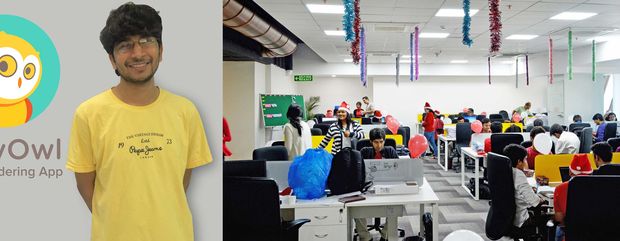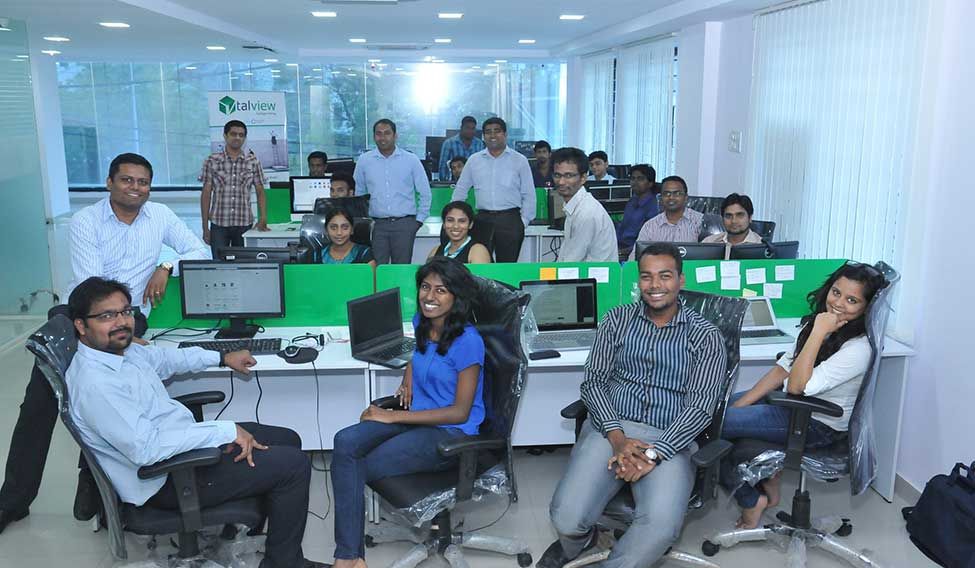Amid a jungle of almost identical glass buildings, it is not easy to locate UrbanClap, an online platform that helps you find professionals like plumbers, photographers or interior designers. But walk in and you know what sets this office apart. Neither the dress code of employees nor the ambience of this place makes it look anything like a corporate office.
Dressed in cool casuals like torn denims, summery tees, loafers, stylish tops and ballerinas, some employees are seated at their orange and yellow hued workstations, some recline on cozy bean bags and some others are engaged in animated conversations with colleagues in the lounge area, where the walls are adorned with pictures of winged dolphins.
“I believe in maintaining an informal, free work environment and power democratisation at workplace. And giving people the choice to dress the way they like is the first step in this direction,” says Raghav Chandra, cofounder of the company. “The last thing I would want someone to do is wear formal clothes and come to work when it is clear they are not used to it. I want people to be themselves. After all, it is not a school.”
Wearing a pair of denims, blue T-shirt and leather sneakers, Chandra is about to step inside a meeting to discuss the company’s business strategy with partners, Varun Khaitan and Abhiraj Bhal, and investors—all dressed in casuals. “Ninety-nine per cent of the time I am in a pair of denims and a T-shirt. That’s me!”says Chandra, 25. “Besides, someone as young as me looks odd, like an imposter, wearing a suit to a meeting.”
Till a few years ago, being part of the corporate world meant power-dressing, speaking sophisticated language and conducting oneself formally (read cautiously) at workplace. But brimming with confidence and a strong sense of personal identity, young entrepreneurs are changing the rules of the game. From walking into office in casuals to interacting with clients in the Urban Dictionary lingo and creating a vibrant, fun and informal work environment for its employees, young corporate India is going casual.
A trend kick-started and endorsed by the likes of Bill Gates and Steve Jobs in the west, casual dressing is now being increasingly accepted as the new formal by Indian companies, too. And industry experts say from helping in building a positive work environment to keeping employees motivated and strengthening the bond between employees and the employers, casual is a virtue nowadays. And, it also helps achieve the goal of enhanced productivity.
“Gone are the days when employees were judged by their dressing style. Now, it is not about what you wear but what you do,” says Harshvardhan Mandad, cofounder and CEO of food ordering app TinyOwl. “Entrepreneurs are realising the more comfortable their workforce is, the more productive they would be. In addition, you know that if the need arises they wouldn’t disappoint you by wearing torn jeans to a super-formal event. They are adults and you have to trust their sense of discretion.”
Moreover, going to office in boring formals becomes monotonous after a point. “Who doesn’t want to go to a vibrant place that’s buzzing with cool and good-looking people? An exciting workplace keeps employees' spirits high,” says Mandad, 25.
This is precisely why video interview platform Talview’s cofounder and CEO Sanjoe Tom Jose cautions people against rebuffing it as a fashion fad. A company’s dress code reflects the kind of work culture it has and the kind of relationship it wants to nurture with its stakeholders—formal or informal. “It has direct bearing on productivity and attrition rate, a big issue faced by the corporate sector. I want a very friendly work environment where there is no hierarchy. So, we steer clear of hierarchy indicators like power dressing or cubicles,” says Jose, who is based in Bengaluru.
 Keeping it casual: Harshvardhan Mandad, cofounder of TinyOwl, says these days it is not about what you wear but what you do.
Keeping it casual: Harshvardhan Mandad, cofounder of TinyOwl, says these days it is not about what you wear but what you do.
When people feel at home, they don’t quit, says Jose. In the last three years, only three employees have quit Talview, which has a staff of 56. To keep the energy levels high, the office is tastefully done in bright hues. There are bean bags and sofas to work on, and employees are allowed to take an afternoon nap in office. An office party is organised every week at a happening hangout zone and employees are allowed to bring some of their friends to the do. “We don’t want employees to have disconnected personal and professional lives. This affects their output,” says Jose.
He says not just clothes, but this casualness is gradually trickling down in almost every aspect of corporate world because if about a decade ago the prime focus of companies was on customers, now it is on employees. Perhaps that is why even big players with relatively conservative ideas about office wear and work culture are gravitating towards casual. For instance, technology giant Infosys recently gave up its formal dress code to embrace smart casuals. Similarly, FMCG major Hindustan Unilever changed its policy a few weeks ago, allowing employees to opt for casuals at work.
“You have to change with time,” says Pankaj Munjal, co-chairman and managing director of Hero Cycles. “You become one with the employees when you dress up and talk like them.” For its new office space coming up at Gurgaon, the company has opted for “cool décor and casual dress code” for its employees.
So, what are the reasons behind the mindset change of corporate India? “Startups, attracting best talent churned out of top business schools and technology institutes, have rung alarm bells for big corporate firms that it is high time to accept the young workforce’s liking for casual dressing and work culture,” explains Jose.
Pushkar Singh, founder and CEO of LetsTransport, a techno-logistics provider, however, says the growing acceptance of casual wear reflects a bigger societal shift. “While earlier people’s job choices were driven by need, nowadays they are driven by passion,” he says. “In the yesteryear, the brand one worked with formed a part of his identity. These days, fresh corporate entrants are more confident and conscious about their identity and join a company only if it is in sync with their personality. That’s why casual clothing has become the preferred choice of office wear and companies understand that.”













